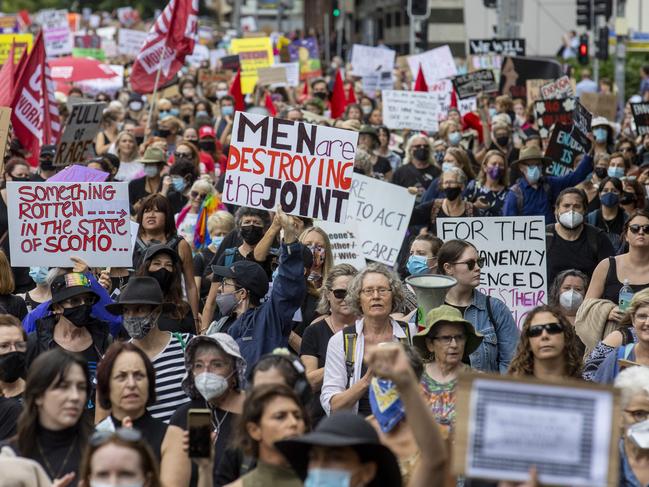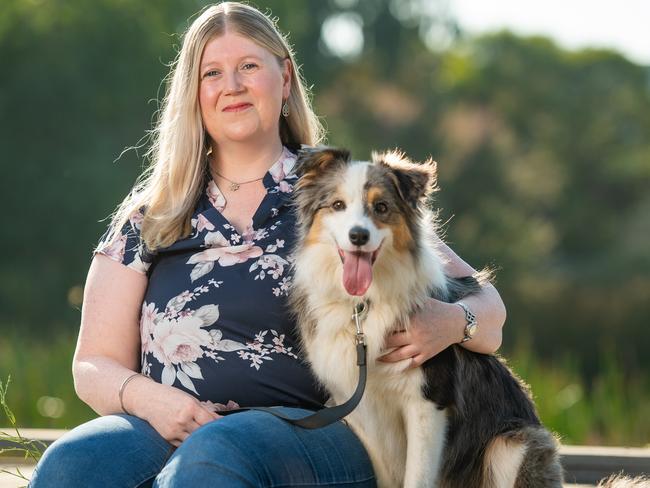New coercive control laws to fight financial abuse, domestic violence
Laws to better protect those whose partners abuse them economically are now being planned in every state and territory in Australia. Here’s how it will work.
National
Don't miss out on the headlines from National. Followed categories will be added to My News.
It’s the secret tactic used by almost every family violence offender – abusing their partners financially in order to control them.
Up to 90 per cent of those trapped in family violence relationships are thought to have been subjected to economic abuse, a hidden epidemic which experts say also contributes to physical violence because it makes it harder for the abused party – almost always a woman – to leave.
Laws to better protect those whose partners abuse them economically by controlling their finances are now being planned in every state and territory in Australia, to tackle behaviour which can see women coerced into taking on debt, having their money or earning capacity withheld, or having no control over how their money is spent.

The Senate and the House of Representatives have passed a cross-party motion calling for further government action on the insidious abuse known as coercive control, which is both psychologically abusive, and an enabler and indicator of further physical violence
With Tasmania the only jurisdiction in Australia which specifically criminalises coercive control in a family violence context, every other state and territory is now considering its position.
In Victoria, the groundbreaking royal commission in 2015 did not recommend such laws, but the Government is now reviewing the legislation to see if coercive control should be specifically criminalised.


In NSW the Government is waiting for the findings of a Parliamentary select committee inquiry into coercive control legislation, while Queensland set up a task force to examine laws and South Australia has a Bill before the Parliament.
The move has taken on further urgency following this week’s March4Justice rallies, which saw thousands of women bring their fury about ongoing gender-based violence and abuse to the streets in a powerful show of strength.
The CEO of peak body Domestic Violence Victoria Tania Farha told News Corp Australia economic abuse was one of the least recognised and understood forms of family violence, so it was difficult to accurately determine its prevalence.
“Research suggests it occurs in 50-90 per cent of family violence cases,’’ Ms Farha said.
“Economic abuse can be a barrier to leaving a violent partner or recovering from family violence.
“In most cases, victim survivors never fully recover financially from family violence.’’

Ms Farha said tactics of economic abuse included preventing a partner or family member from earning or having access to money, refusing to contribute to shared expenses, forcing them to take on debts, prolonged family court proceedings or non-payment of child support.
“Coercive control is a defining feature of all types of family violence. Economic abuse is one way perpetrators gain control over their victims and will often be used together with other tactics of violence and abuse in a pattern of coercive control,’’ she said.
“Fortunately, many banks and services are becoming aware of these tactics and working to provide solutions.’’
Ms Farha called for better resourcing of the systemic response to family violence, to better respond to coercive control and economic abuse including the different tactics of abuse.
“Victim survivors of family violence can experience ongoing abuse after separating from their partner, which can have extreme economic impacts,’’ she said.
“Within the Family Court, for example, prolonging family court proceedings, hiding assets, stalling joint property or debt settlements, and not paying child support are all tactics perpetrators use to continue exerting control over their victim. Research has shown that victims of family violence will often settle for less than what they are entitled to in order to avoid ongoing control and abuse. ‘’
Carolyn Bond is the project manager for the Economic Abuse Reference Group, a national network of community organisations which influences business and government responses to economic abuse and other forms of family violence.

“Economic Abuse is one form of family violence, and tends to occur in conjunction with other forms of family violence such as emotional abuse and physical abuse,’’ Ms Bond said.
“Just like reducing the level of family violence, it’s complex and requires changes in attitudes about women (who are most likely to experience abuse) and controlling behaviours.
“It’s a mistake to think that this results from a lack of understanding of finances. I have spoken to accountants and lawyers who have experienced economic abuse, so it results from controlling relationships rather than a lack of financial education.’’
In Victoria, the State Government provides funding for 21 family violence financial counsellors.
The Economic Abuse Reference Group works closely with banks, energy companies and telcos to help them develop policies and responses to help vulnerable customers such as those experiencing family violence and economic abuse.
Ms Bond said broad social and cultural change was needed to address the problem. But she said it was a positive step that as a result of the industry changes, tens of thousands of workers were now trained to better recognise family violence and economic abuse.
‘HE ALWAYS HAD ONE FOOT OUT THE DOOR’
Cathy Oddie was an educated, financially literate 31-year-old with a good job, zero debt, a share portfolio and a housing deposit saved when she met the man who would become her long-term boyfriend.
Six years later, he walked out on her and on the $50,000 joint loan he’s convinced her to sign up for.
Ms Oddie, now 42, is still paying down that loan, has not been able to take a holiday for years, and has at times felt suicidal as she battled to get her bank to understand her circumstances.
She is one of hundreds of thousands of Australian women who suffered violence at the hands of her domestic partner – including economic control, which is increasingly recognised as a major component of abusive relationships.
“We were together for 6.5 years and when things finally ended, as a result predominantly of the different addictive behaviours that my ex-partner had, by the end it had accrued into almost $70,000 of debt, one of which was a $50,000 joint loan,’’ Ms Oddie told News Corp.
“He walked out, left me with that and refused to make any contribution to the repayments.
“He’s from a different country and ultimately, about two years after our relationship ended, he returned to his home country and that made the situation even harder.’’
Her ex-partner wasn’t able to work regular jobs due to his visa status, so she had supported him financially.
When she needed to take unpaid leave to care for her ill mother, and recover from a neck injury, he refused to adjust his lifestyle, and insisted on spending up big on clothes, restaurants, hotels and music festivals.

Her efforts to get him to live within their means failed, and he abused her, suggested she suffered from bipolar disorder, and implied he would leave her because he couldn’t live with someone who was “boring.’’
“He always had one foot out the door,’’ Ms Oddie recalled.
The bills poured in, and a deeply stressed Ms Oddie took on greater credit card debts, juggled bills and tried to make it work.
Eventually, they took out a personal loan to consolidate their debts. Then, her ex walked out, abandoning her and the loan.
“That was 2016,’’ she recalled.
“We are in 2021 now, I am still repaying that debt, it still has a massive impact on my financial wellbeing. I still find things incredibly tough.’’
Ms Oddie was at first unable to reach a resolution with her bank, and said she was told to stop making the repayments, which she didn’t want to do because it would affect her credit rating.
She also declined to accept the bank’s advice to declare bankruptcy, as she worked in the finance sector (first for Centrelink then the superannuation industry) and could not work as a declared bankrupt.
After three years negotiating, her case was escalated to a manager, and the bank helped reduce her loan and write off some of her arrears.
Importantly, they also agreed not to deal with her case as a one-off, and instead developed policies and procedures to deal with cases such as hers, where a person has been coerced into taking on debt.
“The most important thing was they committed in writing they were going to be creating a policy and training their staff appropriately and for me that was the biggest win,’’ Ms Oddie, who works as a family violence lived experience consultant, said.
“I am at a point now where I’ve got $20,000 in total left in debt to my name. I will be debt free by the end of next year and I plan when I pay that final payment on that joint loan to get a bottle of champagne and I plan to celebrate because I cannot wait until I am no longer connected in name with my ex-perpetrator.’’
IF YOU NEED HELP IMMEDIATELY PLEASE CALL:
*National Sexual Assault, Domestic Violence Counselling Service 1800 RESPECT on 1800 737 732
*24-hour Emergency Accommodation helpline on 1800 800 588
*Safe At Home helpline on 1800 633 937
*Family Violence Crisis and Support Service on 1800 608 122
*Bravehearts – Sexual Assault Support for Children on 1800 BRAVE 1
*Men’s Referral Service on 1300 766 491 or Don’t Become That Man on 1300 243 413
*Lifeline on 13 11 14
Women’s Legal Service Victoria
Financial Counselling Australia




